Happy Thursday! The Cannes Film Festival recently announced that attendees would be banned from “full nudity” and wearing “voluminous outfits, in particular those with a large train” on the red carpet. Who wants to break the news to Steve and Jonah before they get there?
Quick Hits: Today’s Top Stories
- President Donald Trump met with former militant leader and Syrian interim President Ahmed al-Sharaa in Saudi Arabia on Wednesday, one day after the U.S. announced plans to lift all sanctions on Syria. During the encounter, Trump urged al-Sharaa to normalize relations with Israel and work with the U.S. to prevent a resurgence of the Islamic State in his country, according to a post on X by White House press secretary Karoline Leavitt. Al-Sharaa was himself the target of American sanctions for leading a U.S.-designated terrorist group during Syria’s civil war, but the White House has since reversed the designation.
- A Palestinian terrorist opened fire on Israeli cars on a West Bank road Wednesday night, critically wounding a pregnant woman, Tzeela Gez, on her way to give birth. The 30-year-old mother of three later succumbed to her wounds in the hospital, while her husband, Hananel, was lightly injured. The couple’s newborn remains in serious condition after doctors performed an emergency C-section. Israeli soldiers launched a manhunt for the attacker on Wednesday, closing off the entrances to a Palestinian village near the couple’s home in Bruchin. Israeli Prime Minister Benjamin Netanyahu condemned the shooting, vowing to hold its perpetrators accountable.
- German police arrested three men in connection with an alleged Russian plot to plant explosives in shipments bound for Ukraine, prosecutors said Wednesday. The German federal prosecutor’s office said that two Ukrainian nationals were detained in Germany last week, while a third Ukrainian man was apprehended in Switzerland on Tuesday. The arrests come after a string of Russian sabotage efforts across Europe, including a suspected arson attack at a Polish mall, apparent bombings at DHL hubs in Germany and Britain, and the severing of undersea cables in the Baltic Sea.
- Director of National Intelligence Tulsi Gabbard on Wednesday fired Michael Collins, the acting chair of the National Intelligence Council, and his deputy. The move came a week after the partial release of an NIC report contradicting the White House’s claims that the Venezuelan government was coordinating with the Tren de Aragua gang, a key part of the administration’s justification for invoking the Alien Enemies Act to deport alleged gang members. Late last month, following initial media reports on the assessment, Gabbard said that she had requested that the Justice Department investigate alleged leaks from “deep state criminals” within the intelligence community.
- A federal grand jury in Wisconsin on Tuesday indicted Milwaukee County Circuit Judge Hannah Dugan on charges of obstructing or impeding a proceeding before a U.S. department or agency, and concealing an individual to prevent his discovery and arrest. Dugan was detained by the Federal Bureau of Investigation last month for allegedly escorting Eduardo Flores-Ruiz, a Mexican migrant on trial in her court, out of her courtroom after federal law enforcement arrived at the proceedings to carry out his arrest. “Judge Dugan asserts her innocence and looks forward to being vindicated in court,” her lawyers said in a Tuesday statement.
- California Gov. Gavin Newsom, a Democrat, proposed in a budget plan released Wednesday to end free health insurance coverage for illegal immigrants. Under the proposals, illegal immigrants who are enrolled in Medi-Cal, the state-sponsored version of Medicaid, would be required to pay a $100 monthly premium in 2o27, and new enrollment from illegal immigrants would be frozen as soon as next year. “While fiscal headwinds require tough decisions right now, our commitment to access remains,” Newsom said in a statement from his office. California currently faces a likely budget deficit of $12 billion next year and the governor’s office projects that this proposal will save $5.4 billion by 2028-29.
‘History Is Repeating Itself’

As President Donald Trump embarks on a high-profile tour of the Gulf this week, one of the world’s deadliest conflicts continues to rage just across the Red Sea. The war in Sudan, now in its third year, has left tens of thousands of people—and by some estimates many more—dead and forced millions more from their homes.
Fighting between the Sudanese Armed Forces (SAF) and Rapid Support Forces (RSF) paramilitary group began in April 2023, when the two armed factions—former allies in the overthrow of deposed President Omar al-Bashir—derailed the country’s fragile transition to democratic governance. And the conflict shows no signs of slowing more than two years later, despite its vast humanitarian toll. Meanwhile, the Trump administration’s cuts to foreign aid threaten to deprive Sudanese civilians of vital supplies at a moment of peak desperation.
Last month, the Sudanese army, led by Gen. Abdel Fattah al-Burhan, regained control of the country’s capital of Khartoum after more than two years. But any momentum from the strategic victory may have been short-lived, as the RSF renews its attacks from Darfur in the west to Port Sudan in the east and its leader, Mohamed Hamdan “Hemedti” Dagalo, seeks to form a rival government. “We do not seek domination, but unity,” he said in April, on the second anniversary of the war’s start. “We believe that no tribe, region, or religion holds a monopoly over Sudanese identity.”
As the two armed groups vie for political dominance, there is little reason to believe the fighting will abate any time soon. “There is no ideology that people are fighting for,” Cameron Hudson, a senior fellow in the Africa Program at the Center for Strategic and International Studies, told TMD. “These armies are fighting for their own personal survival and their control over the economic and political benefits that come with running a country. So the biggest obstacle to peace is the fact that the parties themselves don’t want peace.” Meanwhile, Hudson added, Sudanese civilians are “too occupied with survival to demand peace, or to have an organized political campaign for peace.”
According to the latest figures from the United Nations Refugee Agency, the conflict has displaced upward of 12.4 million people—significantly more than in Gaza and Ukraine combined. And the resources available to humanitarian groups in Sudan and neighboring countries have been stretched thin by the crisis. An estimated 400,000 people were forced to flee as the RSF took over the Zamzam displacement camp in North Darfur last month, with many streaming into Chad, where the Trump administration’s aid cuts have exacerbated existing food, water, and medicine shortages.
Across the border, paramilitary fighters have continued their siege on the army-held city of El Fasher, the capital of North Darfur, killing scores of civilians in a bombing campaign and cutting off vital supplies. Sudan is one of the largest countries in the world (by area) and also one of the poorest, ranking 170th out of 193 countries in the latest Human Development Index. It’s also the only place in the world where famine is currently confirmed, according to the World Food Program.
Complicating efforts to get lifesaving supplies to people in need are ongoing attacks on civilian infrastructure. Both sides have hoarded aid and destroyed food stores in an apparent effort to starve the other out. And since early May, Hemedti’s forces have carried out a series of devastating drone strikes on Port Sudan, causing widespread blackouts and threatening the inflow of foreign aid. The bombardment of Sudan’s “lifeline” could have an “immediate and profound impact” on the country’s humanitarian situation, Hudson said. “There are more than 26 million people in need of food aid right now. There’s famine in 10 different Sudanese states. So even the slightest disruption in what meager food aid is getting in is going to have profound consequences.”
Meanwhile, evidence of widespread ethnic violence by the RSF and allied militias continues to mount. In parts of western Sudan under their control, the mostly Arab fighters have targeted indigenous black communities, as we detailed in January:
As early as September 2023, media reports based on more than 100 eyewitness accounts, video footage, and satellite imagery clearly documented the atrocities the RSF had committed in Geneina, the capital city of West Darfur. A subsequent U.N. report presented to the Security Council in January 2024 determined that between 10,000 and 15,000 people had been killed in Geneina in 2023. The report noted that young men fleeing the violence were asked about their ethnicity at RSF checkpoints and “if identified as Masalit, many were summarily executed with a shot to the head.”
The systematic killings, together with ethnic cleansing and sexual violence, led the State Department to formally accuse Hemedti’s forces of genocide during former President Joe Biden’s final weeks in office. But the genocide declaration may have been too little, too late, as Trump largely shuns his predecessor’s last-minute efforts to intervene. “It has articulated no policy toward Sudan,” Hudson said of the Trump administration. And indeed, the president has yet to appoint a special envoy to Sudan, despite congressional efforts to dedicate diplomatic resources to mediating an end to the war.
Hudson attributed the lack of international attention to a sense of “déjà vu” surrounding the conflict. Many of the actors fueling the violence now were key players in the country’s previous bouts of instability, including the RSF, which grew out of the janjaweed, Arab militias behind a multi-year genocide in Darfur in the early 2000s.
“It’s not the first time Sudan’s had a genocide. It’s not the first time Sudan’s had a famine. It’s not the first time Sudan’s had a civil war in the last 10 years, 20 years, 30 years,” he said. “As bad as it is—and it’s never been this bad in Sudan’s history—it feels like history is repeating itself.”
Today’s Must-Read
In 2012, my wife and I were living in a tiny one-bedroom in New York City, but we’d reached the time in our lives when we wanted to start having kids. The solution was to move to Northern Virginia, where a single-family home was in reach if we went deep enough into Fairfax County. I could work from home entirely, and we could both still access our employers’ D.C. offices. The ensuing years saw my wife increasingly work from home as well. Ultimately, we returned to our natural habitat—the Midwest—to work fully remotely, with three kids in tow. As everyone knows, life imposes some tough trade-offs between work and one’s personal business, especially one’s family responsibilities. Working from home has made those trade-offs a lot easier, for me and many others.
WFH policies are being promoted at a time of increasing social isolation. More Americans report having fewer social connections, spending more time alone, and reporting higher rates of loneliness than in earlier eras. However annoying one’s colleagues can be, social interaction is good for us, and it builds camaraderie and collaboration in the context of the workplace. Does this mean everyone should be chained to a desk Monday through Friday? Of course not, but the downstream effects of most of the population spending both their work and leisure time in isolation are unlikely to be positive.
Toeing the Company Line
High-Speed Fail
California has spent billions since 2008 without laying a single piece of track.
The Temptation and the Fall of the Media
A new book animates old arguments about the mainstream media’s blinders.
The Fetterman Rorschach Test
Mental acuity is the new filibuster.
Are We Sleepwalking Toward a Constitutional Crisis?
Congress shrugs at a top White House adviser suggesting the president may suspend the writ of habeas corpus.
Trump’s Executive Order on Drug Prices, Explained
How the president’s directive would actually lower costs—and for whom—is unclear.
Crackpot Realism
Fear and loathing in Vietnam.
Worth Your Time
- Speaking at the University of Notre Dame this week, A.G. Sulzberger—the publisher of the New York Times—delivered a sobering address on the threats facing independent journalism worldwide, including here in the United States. “Since 2016, the number of countries deemed to have a ‘good’ record of protecting press freedom by Reporters Without Borders dropped by more than half. Effectively, in his first term President Trump exported his anti-press rhetoric to illiberal leaders abroad. Those leaders took that rhetoric as permission to develop and implement an aggressive new playbook for cracking down on journalists. Now, in President Trump’s second term, this vicious cycle has been completed as the anti-press playbook he helped inspire has been imported back to the United States. That makes this a perilous moment — the shift from words to action,” he wrote. “My colleagues and I spent much of the last year studying the tools and tactics of this new anti-press playbook, which range from sowing distrust and normalizing harassment to misusing the civil courts and abusing state power. The overarching aim is straightforward. To undermine the social and financial standing of independent news organizations. To sideline journalists willing to ask tough questions and inform the public honestly. And to elevate media figures willing to echo the party line.”
Presented Without Comment
National Review: Trump Meets Syrian President, Calls Him an ‘Attractive Guy’
Also Presented Without Comment
Bloomberg: Apple Readies Feature That Lets Vision Pro Users Scroll With Their Eyes
Also Also Presented Without Comment
New York Times: RFK Jr., the Health Secretary, Says Not to Take Medical Advice From Him
In the Zeitgeist
Waiting for a decent DC movie nowadays can sometimes feel like watching Charlie Brown with the football, but this new trailer for Superman gives us hope that this time, they may connect.
Let Us Know
Why do you think the war in Sudan has largely failed to generate international attention?



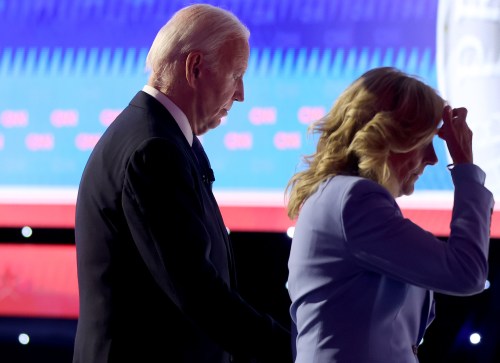
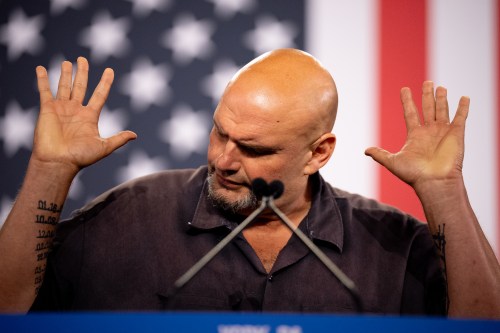
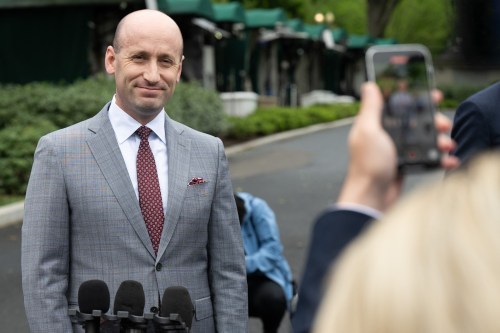





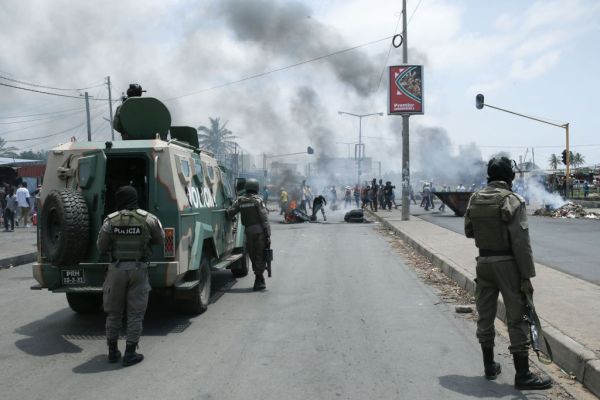
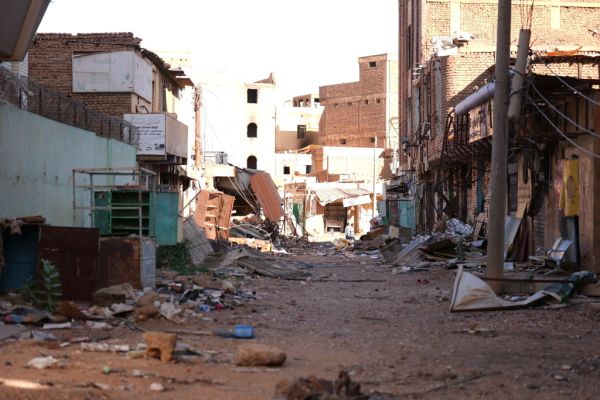
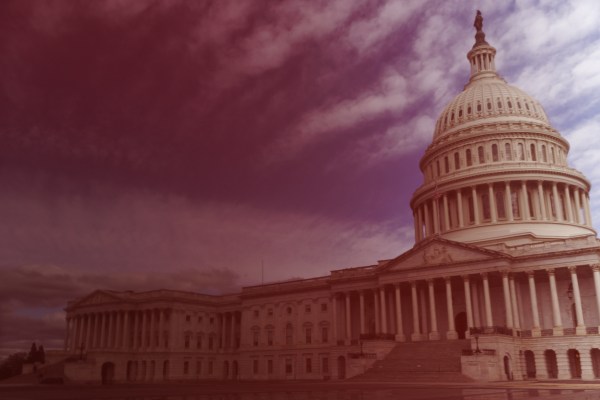
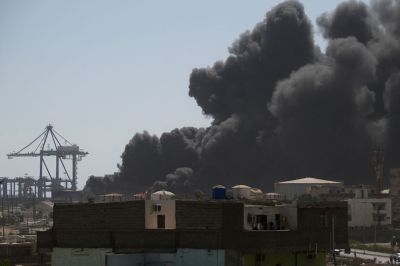
Please note that we at The Dispatch hold ourselves, our work, and our commenters to a higher standard than other places on the internet. We welcome comments that foster genuine debate or discussion—including comments critical of us or our work—but responses that include ad hominem attacks on fellow Dispatch members or are intended to stoke fear and anger may be moderated.
With your membership, you only have the ability to comment on The Morning Dispatch articles. Consider upgrading to join the conversation everywhere.